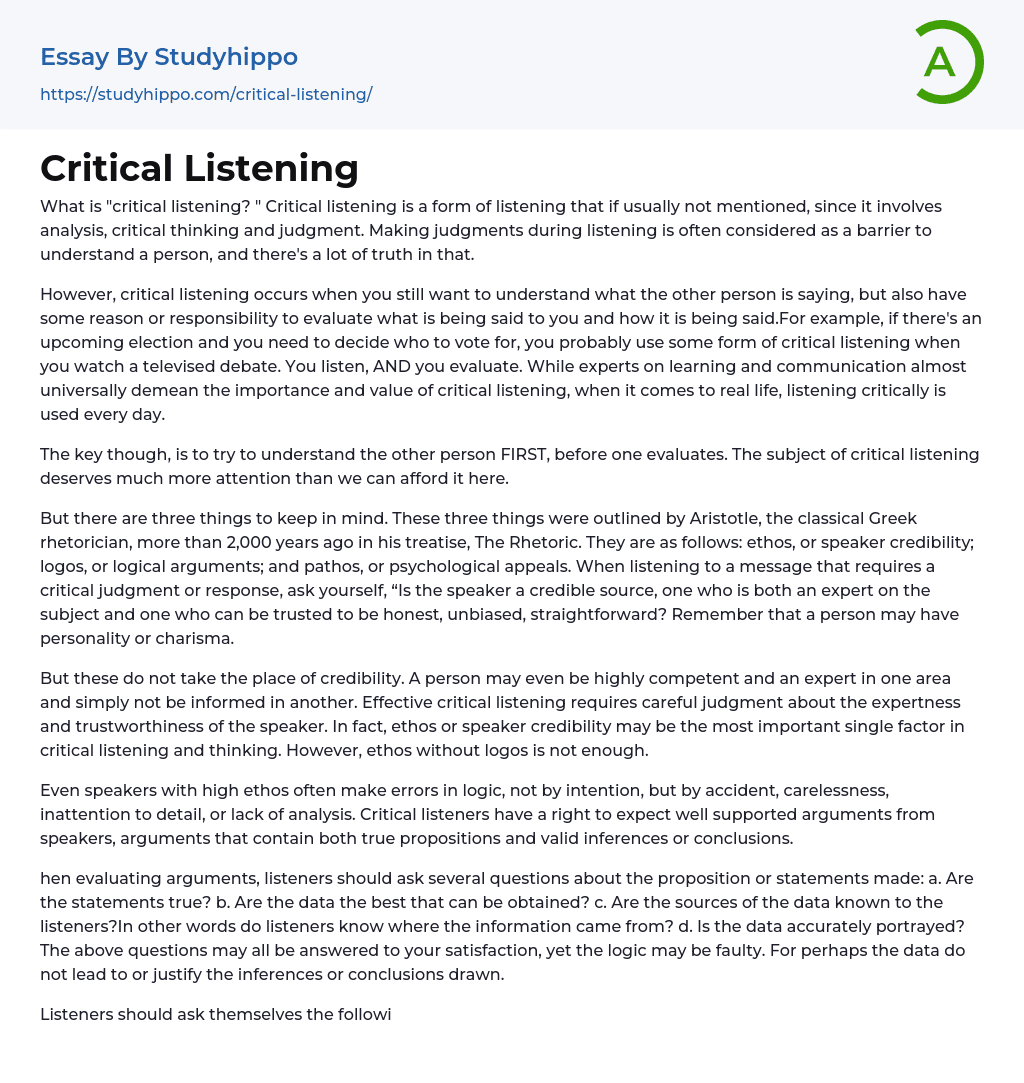What is "critical listening? " Critical listening is a form of listening that if usually not mentioned, since it involves analysis, critical thinking and judgment. Making judgments during listening is often considered as a barrier to understand a person, and there's a lot of truth in that.
However, critical listening occurs when you still want to understand what the other person is saying, but also have some reason or responsibility to evaluate what is being said to you and how it is being said.For example, if there's an upcoming election and you need to decide who to vote for, you probably use some form of critical listening when you watch a televised debate. You listen, AND you evaluate. While experts on learning and communication almost universally demean the importance and value of critical listening, when it comes to real life,
...listening critically is used every day.
The key though, is to try to understand the other person FIRST, before one evaluates. The subject of critical listening deserves much more attention than we can afford it here.
But there are three things to keep in mind. These three things were outlined by Aristotle, the classical Greek rhetorician, more than 2,000 years ago in his treatise, The Rhetoric. They are as follows: ethos, or speaker credibility; logos, or logical arguments; and pathos, or psychological appeals. When listening to a message that requires a critical judgment or response, ask yourself, “Is the speaker a credible source, one who is both an expert on the subject and one who can be trusted to be honest, unbiased, straightforward? Remember that a person may have personality or charisma.
But these do not take the plac
of credibility. A person may even be highly competent and an expert in one area and simply not be informed in another. Effective critical listening requires careful judgment about the expertness and trustworthiness of the speaker. In fact, ethos or speaker credibility may be the most important single factor in critical listening and thinking. However, ethos without logos is not enough.
Even speakers with high ethos often make errors in logic, not by intention, but by accident, carelessness, inattention to detail, or lack of analysis. Critical listeners have a right to expect well supported arguments from speakers, arguments that contain both true propositions and valid inferences or conclusions.
hen evaluating arguments, listeners should ask several questions about the proposition or statements made: a. Are the statements true? b. Are the data the best that can be obtained? c. Are the sources of the data known to the listeners?In other words do listeners know where the information came from? d. Is the data accurately portrayed? The above questions may all be answered to your satisfaction, yet the logic may be faulty. For perhaps the data do not lead to or justify the inferences or conclusions drawn.
Listeners should ask themselves the following questions:
- Is the conclusion a certainty or are exceptions possible?
- Were all cause-effect relationships established beyond doubt?
- Does the data justify the inference drawn or the conclusion given?
Pathos. The psychological or emotional element of communication is often misunderstood and misused.
Simply said, speakers often use psychological appeals to gain an emotional response from listeners. Effective critical listeners carefully determine the focus of the speaker’s message. Speakers may appeal to any one or several needs, desires, or values that
are important to us including: adventure, thrift, curiosity, fear, creativity, companionship, guilt, independence, loyalty, power, pride, sympathy, altruism.There are many others, of course; the list is a long one.
There are several questions critical listeners should ask themselves when assessing the pathos element:
- Is the speaker attempting to manipulate rather than persuade me?
- What is the speaker’s intent?
The distinction between listening for information and critical listening is that the listener evaluates and challenges what they have heard. These challenges might take place in the listener’s mind or be expressed directly to the speaker.
While listening critically it is important to listen for the speaker’s motive and mentally challenge the information they are giving. In sporting context much critical listening goes on when a coach delivers his or her rationale for a particular tactical approach in advance of competition. Listening to such persuasive messages challenges the listener to distinguish between information presented as facts and that presented as opinion.
- John Locke essays
- 9/11 essays
- A Good Teacher essays
- A Healthy Diet essays
- A Modest Proposal essays
- A&P essays
- Academic Achievement essays
- Achievement essays
- Achieving goals essays
- Admission essays
- Advantages And Disadvantages Of Internet essays
- Alcoholic drinks essays
- Ammonia essays
- Analytical essays
- Ancient Olympic Games essays
- APA essays
- Arabian Peninsula essays
- Argument essays
- Argumentative essays
- Art essays
- Atlantic Ocean essays
- Auto-ethnography essays
- Autobiography essays
- Ballad essays
- Batman essays
- Binge Eating essays
- Black Power Movement essays
- Blogger essays
- Body Mass Index essays
- Book I Want a Wife essays
- Boycott essays
- Breastfeeding essays
- Bulimia Nervosa essays
- Business essays
- Business Process essays
- Canterbury essays
- Carbonate essays
- Catalina de Erauso essays
- Cause and Effect essays
- Cesar Chavez essays
- Character Analysis essays
- Chemical Compound essays
- Chemical Element essays
- Chemical Substance essays
- Cherokee essays
- Cherry essays
- Childhood Obesity essays
- Chlorine essays
- Classification essays
- Cognitive Science essays




